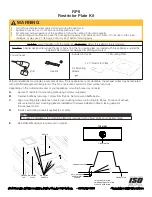
50
FP15 & FP15A Waterloo - Installation and Operation Manual
7
THE VENTING SYSTEM
7.1
General
The venting system, acts as the engine that drives your wood heating system. Even the best fireplace will
not function safely and efficiently as intended if it is not connected to a suitable chimney.
The heat in the flue gases that pass from the fireplace into the chimney is not waste heat. This heat is what
the chimney uses to make the draft that draws in combustion air, keeps smoke inside the fireplace and
safely vents exhaust to outside. You can think of heat in the flue gas as the fuel the chimney uses to make
draft.
7.2
Suitable Chimneys
Your wood fireplace will provide optimum efficiency and performance when connected to an 8-inch
diameter chimney.
7.3
Minimum Chimney Height
The top of the chimney should be tall
enough to be above the air turbulence
caused when wind blows against the
house and its roof. The chimney must
extend at least 1 m (3 ft.) above the
highest point of contact with the roof,
and at least 60 cm (2 ft.) higher than any
roof line or obstacle within a horizontal
distance of 3 m (10 ft.).
7.4
The Relationship Between the Chimney and the House
Because the venting system is the engine that drives the wood heating system, it must have the right
characteristics. The signs of bad system design are cold backdrafting when there is no fire in the fireplace,
slow kindling of new fires, and smoke roll-out when the door is opened for loading.
7.4.1
Why the chimney should penetrate the highest heated space
When it is cold outside, the warm air in the house is buoyant so it tends to rise. This tendency of warm air
to rise creates a slight pressure difference in the house. Called ‘stack effect’, it produces a slightly negative
pressure low in the house (relative to outside) and a slightly positive pressure zone high in the house. If
there is no fire burning in a heater connected to a chimney that is shorter than the warm space inside the
house, the slight negative pressure low in the house will compete against the desired upward flow in the
chimney.
Summary of Contents for Waterloo FP15
Page 10: ...10 FP15 FP15A Waterloo Installation and Operation Manual 2 3 Measurements FP15 ...
Page 11: ...FP15 FP15A Waterloo Installation and Operation Manual 11 ...
Page 12: ...12 FP15 FP15A Waterloo Installation and Operation Manual 2 4 Measurements FP15A ...
Page 13: ...FP15 FP15A Waterloo Installation and Operation Manual 13 ...
Page 77: ...FP15 FP15A Waterloo Installation and Operation Manual 77 ...
Page 87: ...NOTES ...
Page 88: ...88 FP15 FP15A Waterloo Installation and Operation Manual ...
Page 89: ......
















































